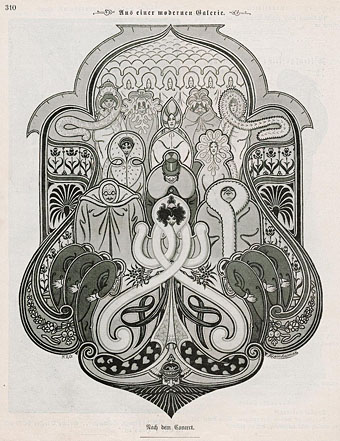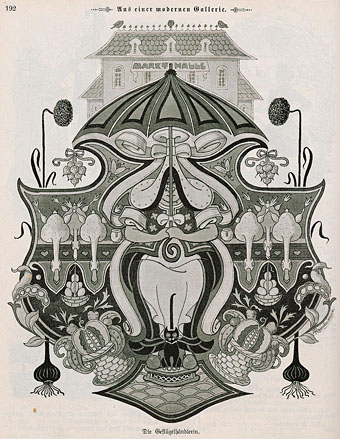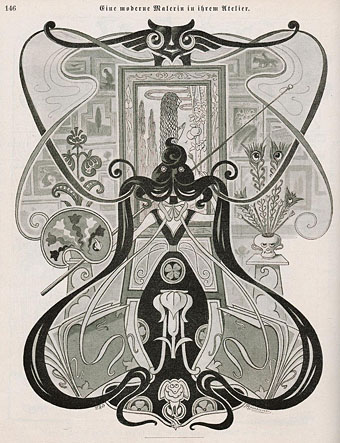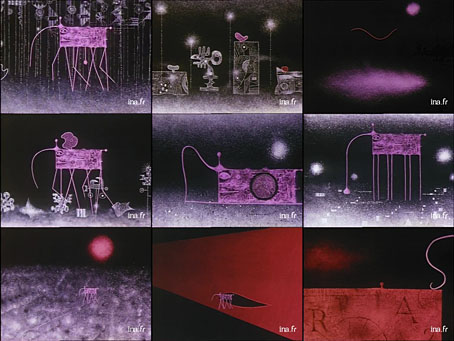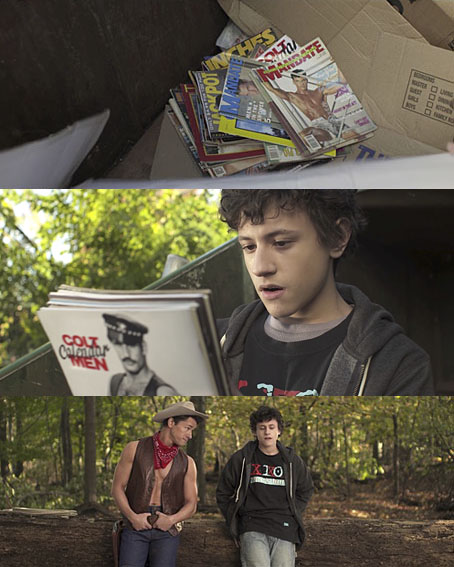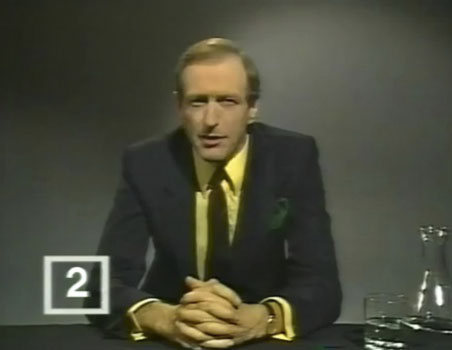Who was A. Reinheimer? That’s a good question to which I have no answer other than telling you that he or she was an illustrator for German humour periodical Fliegende Blätter circa 1900. These drawings caught my eye for being rare examples of the Art Nouveau style deployed for comedic purposes. The intent was no doubt to poke some fun at the style itself—most of these pictures depict contemporary scenes in the “modern style”—but they’re also good compositions which could easily work as more typical Art Nouveau illustrations if their cartoony qualities were reduced. All the pages are from the University of Heidelberg digital archives which has a complete run of the magazine from 1844–1944.
Month: November 2013
Weekend links 187
Delia Derbyshire (2007) by Iker Spozio.
Whatever you think of Doctor Who, Delia Derbyshire’s recording of Ron Grainer’s theme tune is a landmark piece of electronic music. Those glassy electronic tones still sound unique today, not least for their having been created using rudimentary oscillators and much laborious tape editing. In Radiophonic Workshop: the shadowy pioneers of electronic sound, Joe Muggs looks at the history of the BBC’s electronic composers. If you’re a Radiophonic-head then the Alchemists of Sound TV documentary from 2003 is essential viewing.
There’s more (there’s always more): Delia Derbyshire – Sculptress of Sound: part one of a seven-part radio documentary about the great electronic music composer, and Blue Veils and Golden Sands, Martyn Wade’s radio play about Delia. Related: Delia-Derbyshire.org, Delia Derbyshire: An audiological chronology and A History of the Doctor Who theme. And don’t miss: Silence Is Requested In The Ultimate Abyss (1969) by Welfare State and White Noise, an incredible slice of electro-psychedelia from the John Peel Presents Top Gear album.
• “Why don’t books for grown-ups have illustrations any more?” asks Christopher Howse. Some of them do, this past week I’ve been finishing a new series of illustrations for a story anthology.
• From 2006: Ian Penman on cigarettes, espionage, and the masterful (and superior) television adaptation of Tinker, Tailor, Soldier, Spy.
It was Malcolm [McLaren] who suggested that the main characters be a boy who looks like a girl who looks like a boy and vice versa. What was strange was that, actually, in 1985 this was nobody’s vision of the fashion industry. Since then, fashion and fascism have crept closer: you’ve got John Galliano doing his promotional bits for the Third Reich, you’ve got Alexander McQueen killing himself, you’ve got Versace and that horrible, violent stalker coming for him. Since it was written, almost all of it has come true apart from the nuclear winter, but I think we’re working on that. The actual society that the story happens in is much more like the society we have now than culture was in 1985.
Alan Moore on Fashion Beast, Situationism, and why he hates superheroes.
• KW Jeter talks about his latest novel, Fiendish Schemes, and the “cultural juggernaut” that is steampunk.
• Grit and Social Dynamics in Smoke Ghost: Elwin Cotman on the weird fiction of Fritz Leiber.
• The Secret Lives of the Vatican’s Gay Cardinals, Monks, and Other Clergy Members.
• Don Cherry & Organic Music Theatre, live in the RAI TV studios, 1976.
• Otherworldly Art and Photography: Mlle Ghoul finds the best things.
• From 1998: Rahma Khazam on composer Bernard Parmegiani.
• Mix of the week: Marshland: The Mix by Hackneymarshman.
• “Let’s colonize the clouds of Venus,” says Ian Steadman.
• J. Hoberman on David Cronenberg’s Visual Shock.
• The Delian Mode (1968) by Delia Derbyshire | Tom Baker (1981) by The Human League | Doctor Who? (1984) by Doctor Pablo & The Dub Syndicate
L’Araignéléphant
L’Araignéléphant (1967) is another of the strange animations made by Piotr Kamler in the 1960s and 1970s, this one being a 9-minute piece concerning the travails of “the spiderelephant”. As with Kamler’s Le labyrinthe, the music is by the French electroacoustic composer Bernard Parmegiani whose death was announced this week, hence the link. Parmegiani had a varied career which included scores for a number of other films (among them a Jan Lenica short, A, which I’ve not been able to find), and more commercial music than people at his serious end of the composition scale usually produce.
Ubuweb has a selection of Parmegiani’s longer compositions, one of which, Pop’eclectic (1969–1973), chops up pop and classical recordings (spot the Small Faces!) in a manner which would become commonplace a decade or so later with the advent of sampling. The Kamler films, meanwhile, are all available on a single DVD where the narration for L’Araignéléphant—which doesn’t explain very much—is subtitled.
Previously on { feuilleton }
• Psyché Rock
• Le labyrinthe and Coeur de secours
• Chronopolis by Piotr Kamler
Jackpot by Adam Baran
Jackpot is a 10-minute film by Adam Baran about a gay teen in 1994 who goes looking for a stash of abandoned gay porn mags. Baran says:
I really made the film because I loved teen movies and never really saw one for gay kids that both addressed their sexuality in the way that straight movies like Weird Science or American Pie or Superbad did, and let them get what they want. Jack in my film learns that he has to fight back for what he wants, even if it means he has to take a couple of licks. I think that’s a resonant message for gay kids everywhere.
I mentioned the Kickstarter completion bid for this a couple of years ago then promptly forgot about it so it’s good to find that the film got made, and won Best Short at the 2013 Miami Gay and Lesbian Film Festival. The whole thing can now be watched on Vimeo where Baran is trying to raise money to expand Jackpot into a feature. Via Towleroad.
Graham Chapman’s opinion
The announcement this week that the surviving members of the Monty Python team were getting back together has caused an understandable flurry of excitement. This isn’t something I share despite having the entire run of the Python films and TV series on DVD. I usually feel the same way about band reunions: rather than revisit past glories I prefer to see people doing something new. That said, it would be nice if Eric Idle would allow a DVD release of his Rutland Weekend Television series. His low-budget Python spin-off was broadcast once in the 1970s and hasn’t been seen since, to the continual annoyance of co-star and collaborator Neil Innes.
Graham Chapman will be absent from the reunion, of course. His polemic for Channel 4’s Opinions has nothing to do with Monty Python beyond his presence but it’s something I’ve always remembered so it’s good to find it on YouTube. Opinions was a run of half-hour pieces-to-camera by a different person each week; I saw this one when it was broadcast in 1984 but don’t recall any of the others. Chapman’s contribution was memorable at the time for his talking directly and unapologetically about alternatives to heterosexual relations, and what we’d now call hetero-normativity. This would hardly raise an eyebrow today but in 1984 attitudes towards gay people in the UK were growing increasingly harsh under a right-wing government, a virulent press, and the beginning of the AIDS crisis. Chapman’s plea for universal tolerance wouldn’t have made much of an impression but it was good to hear someone talking this way, even if only for 30 minutes on the channel with the least amount of viewers. Chapman was the first person I saw talking on TV about being gay at a time (the 1970s) when few people in public life dared to admit such a thing. His cheerful example was a great riposte to an atmosphere of widespread fear and loathing. His Opinions piece is witty, silly, over-exuberant (as his acting often was), and self-reflexive in the manner the Pythons made their own. You also get to see his partner, David Sherlock, in a variety of background roles. Watch it here.

